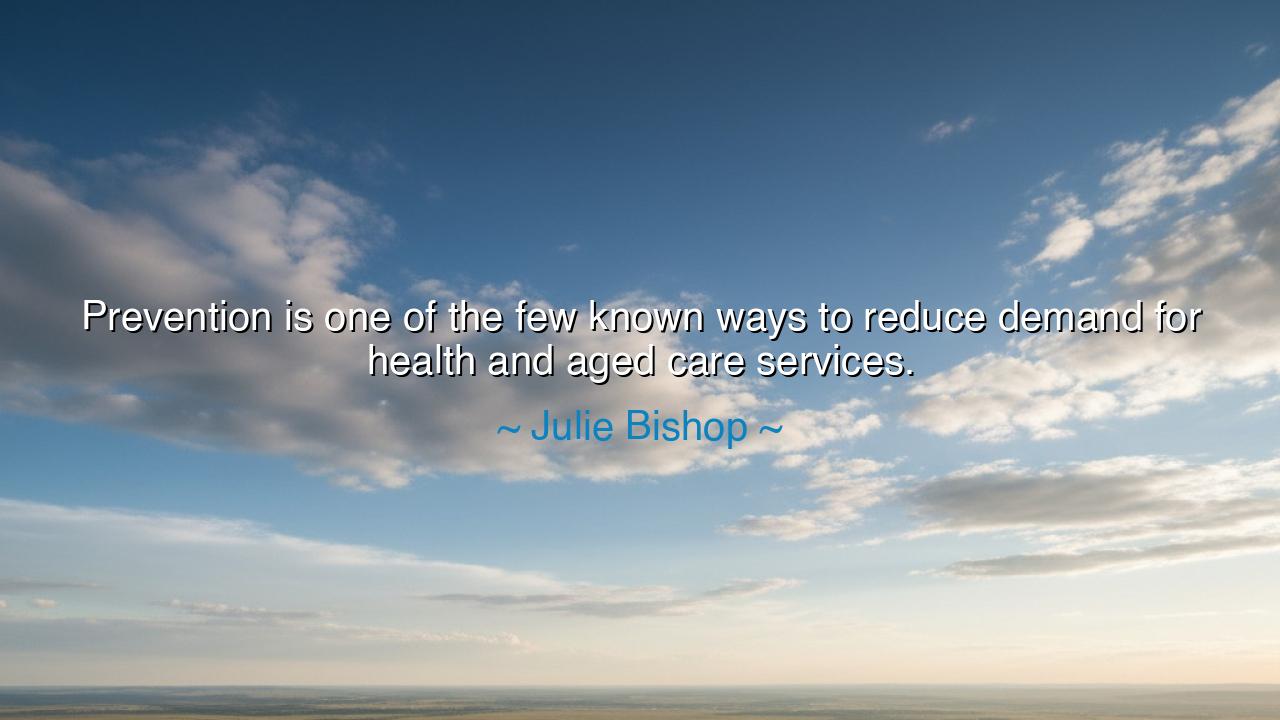
Prevention is one of the few known ways to reduce demand for
Prevention is one of the few known ways to reduce demand for health and aged care services.






The words of Julie Bishop — “Prevention is one of the few known ways to reduce demand for health and aged care services.” — speak not merely of medicine, but of wisdom. Her words, simple yet profound, echo the ancient truth that the greatest healer is foresight. To prevent is to protect, to act before harm arrives, to sow the seeds of wellness before the storms of sickness descend. Beneath this practical insight lies a spiritual principle as old as humanity itself: that true strength is not found in recovery, but in preservation — not in curing disease, but in cultivating health.
From the dawn of civilization, the wisest among our ancestors understood this law. The ancient physicians of Greece and China did not seek to treat the sick alone; they sought to keep the healthy from falling ill. The Chinese masters of medicine were once paid not for healing, but for maintaining the well-being of their community — for they knew that when illness arises, it is already the sign of imbalance long ignored. Likewise, the sage Hippocrates taught that the body’s harmony is its own defense, and that the task of the healer is to preserve that harmony before it breaks. Julie Bishop’s words are the modern echo of this ageless teaching — a reminder that prevention is not only science, but wisdom in motion.
The origin of her reflection lies in the changing heart of modern society. As a stateswoman, Bishop witnessed the growing burden upon health and aged care systems — hospitals filled beyond capacity, physicians exhausted, nations struggling under the weight of care. Yet, amid this strain, she saw a simple truth that leaders often overlook: prevention is not a cost; it is an investment. Each act of prevention — whether it be education, exercise, vaccination, or clean living — ripples outward to preserve life, dignity, and the resources of nations. Her words call upon humanity to shift its gaze from treating the end to nurturing the beginning, from crisis to care.
History itself provides a powerful testament to this principle. In the 19th century, when disease ravaged the cities of Europe, it was not medicine that first saved the multitudes, but sanitation — clean water, waste management, and hygiene. The work of John Snow, who traced the spread of cholera to a contaminated water pump in London, transformed the world’s understanding of public health. His discovery was not a cure but a prevention, a shield raised before death could strike. From that revelation emerged the foundations of modern health systems, proving that the truest triumph of medicine lies not in the hospital bed, but in the home, the school, the street, and the habits of daily life.
Yet, Bishop’s wisdom stretches beyond the walls of medicine. It touches upon the philosophy of time itself — the understanding that the future is shaped not by what we endure, but by what we avert. Prevention is an act of compassion toward one’s future self, a gift of foresight from the present to the years ahead. It is the discipline of care, the quiet courage to make wise choices long before necessity demands them. The ancients called this virtue prudence, the ability to act not for the moment, but for the ages. In this, prevention becomes not just a public policy, but a way of living — a reverence for life expressed through daily mindfulness.
There is, too, a moral depth to her message. When societies neglect prevention, they do not only invite illness; they betray the vulnerable — the elderly, the poor, the weary. For it is they who suffer most when systems collapse, when hospitals overflow, when care becomes scarce. Thus, to invest in prevention is to honor the sanctity of every life, to uphold the dignity of the old and the hope of the young. It is a form of justice — quiet, practical, and profound — for it distributes health before wealth can divide it.
So, my children of this modern age, take this lesson to heart: cherish prevention as the first act of healing. Guard your body with rest, nourish it with clean food, strengthen it with movement, and purify it with moderation. Tend to your mind as carefully as your flesh, for worry and anger are diseases as real as any plague. Care for your communities as you would for your own kin, for the health of one is the health of all. Prevention is not only medicine — it is love made practical, foresight made sacred.
And thus, Julie Bishop’s words endure as both wisdom and warning. In an age of cures, she calls us back to the source; in an age of treatment, she reminds us of balance. For if we learn to prevent, we will not only live longer — we will live wiser. Health is not the absence of sickness, but the presence of care, and prevention is the highest form of that care — the eternal guardian standing at the gates of life, keeping watch while we thrive in peace.






AAdministratorAdministrator
Welcome, honored guests. Please leave a comment, we will respond soon